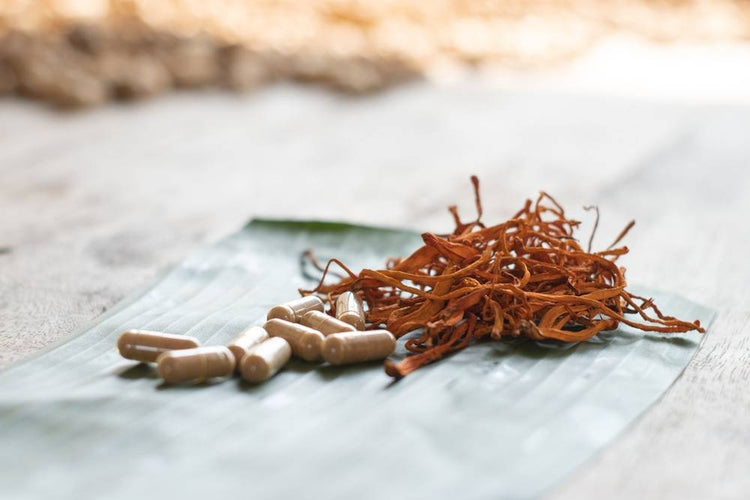In this guide, we will be exploring one of the more unique edible mushrooms out there – one that, technically speaking, isn't even a mushroom!
You'll be learning all about the benefits of cordyceps mushrooms, including what it is, where it originates, and how people are using it as a supplement in their health and wellness routines. And, of course, we'll help you figure out exactly where to buy cordyceps mushroom supplements made with science-based formulations and first-class ingredients.
So, get ready to learn even more about mushrooms and their exceptional variety of benefits for your wellbeing.
A Brief History of Cordyceps Mushrooms
Cordyceps mushrooms can be found all around the globe, with hundreds of different species growing in various countries. Scientifically speaking, cordyceps aren't exactly a mushroom. Instead, they are a relative of mushrooms classified as entomopathogenic fungi, meaning that they naturally grow on the bodies of insects.
There are descriptions of cordyceps in centuries-old books about Chinese and Tibetan medicine, and traditional healers frequently recommend it. Depending on the individual's needs, a healer may suggest using cordyceps alone or with a plethora of other beneficial herbs. It is sometimes known as "gumba,""gonba," or "gunba" in local dialects. It is hailed for purported benefits that include enhanced energy, vitality, reproductive function, and the treatment of many conditions.
There are two species of cordyceps in particular that have attracted the attention of researchers and natural health advocates alike: Cordyceps militaris and Cordyceps Sinensis. These varieties have undergone significant research and have a long list of potential health properties.
The Power Behind Cordyceps Mushroom Benefits
Scientific studies about cordyceps mushroom benefits have focused on how their biological and pharmacological makeup could be helpful in the wellness arena.
Generally speaking, multiple studies show that cordyceps may help combat many immunological disorders and cardiovascular and renal diseases. Beyond that, there are also many other potential benefits of cordyceps mushrooms worth knowing.
Improves Oxygen Consumption
It is thought that cordyceps mushrooms may support the body’s ability to produce adenosine triphosphate (ATP). ATP is a molecule responsible for delivering energy to your muscles and may contribute to more efficient oxygen consumption, especially during physical activity. Studies focusing on how cordyceps helps fitness level measured an average 7% performance improvement in older adults and an 11% increase for younger adults, and a positive change in overall exercise endurance.
Generations of people have relied on cordyceps for anti-aging properties, particularly the elderly in Eastern cultures. But does cordyceps actually help slow the aging process?
Cordyceps are rich in antioxidants, which are well-known to neutralize the free radicals that catalyze aging and disease. For older adults, cordyceps led to improved memory and sexual health. What's more, animal studies found that cordyceps were capable of extending the overall lifespan – meaning that cordyceps mushrooms might be the metaphorical fountain of youth!
Help Control Blood Sugar Levels
Whether you need blood sugar support due to diabetes or want to encourage balance in your body, cordyceps may be a valuable addition to your supplement regimen. Cordyceps can help regulate and lower blood sugar levels, earning it a potential title as an "anti-diabetic" supplement.
Support Heart Health
We all know that heart health is vital, and virtually everyone can benefit from practices and supplements that support cardiovascular function. Cordyceps mushrooms are approved in China as an arrhythmia treatment, and research has pinpointed a compound called adenosine as the potential source of the cordyceps mushrooms' heart-protective effects.
In terms of cholesterol levels, cordyceps could be beneficial as well. Studies show that it decreases LDL, or "bad"; cholesterol, and triglyceride levels (linked to heart disease when present in high amounts).
Fights Inflammation
Finally, cordyceps may also be able to reduce inflammation in the body. And because excess inflammation can lead to a whole host of health problems, this is a significant benefit. Unique proteins that increase inflammation are suppressed when exposed to cordyceps mushrooms, suggesting that it could be an option for an anti-inflammatory supplement or medicine in the future.
How To Incorporate Cordyceps into Your Daily Routine
Ready to go out there and harvest cordyceps mushrooms? It's not quite that simple. They are notoriously difficult to harvest, so naturally-grown Cordyceps Sinensis fetches more than $9,000 per pound.
Luckily, innovators have figured out how to grow cordyceps mushrooms using a specialized synthetic process, producing a final result called Cordyceps CS-4. You want to make sure you purchase from U.S. NSF-certified retailers to receive high-quality, safe, and authentic cordyceps products.
The easiest way to use cordyceps mushrooms as a supplement is to take them in capsule form.
Shop Premium-Quality Cordyceps Mushroom Supplements Online
Core Culture is an NSF-certified manufacturer of American-made health and wellness supplements, including our Shroom Boom capsules - which contain a generous amount of cordyceps and multiple other beneficial mushrooms. You get five different mushrooms in just two small capsules and their wellness properties. It doesn't get any easier than this!
Browse our full selection of health and wellness supplements to upgrade your health regimen today!
Article Sources:
https://www.ncbi.nlm.nih.gov/pmc/articles/PMC3121254/#ref14
https://www.ncbi.nlm.nih.gov/pubmed/28094746
https://link.springer.com/article/10.1007%2FBF02836405
https://www.ncbi.nlm.nih.gov/pmc/articles/PMC5236007/
https://www.ncbi.nlm.nih.gov/pmc/articles/PMC3121254/#ref15
https://www.ncbi.nlm.nih.gov/pubmed/29547847
https://www.ncbi.nlm.nih.gov/pubmed/18803231
https://www.ncbi.nlm.nih.gov/pmc/articles/PMC4564082/
https://pubmed.ncbi.nlm.nih.gov/15050427/
https://pubmed.ncbi.nlm.nih.gov/27274781/
https://www.ncbi.nlm.nih.gov/books/NBK92758/
https://www.ncbi.nlm.nih.gov/pubmed/23192916/
https://pubmed.ncbi.nlm.nih.gov/21882527/
https://www.ncbi.nlm.nih.gov/pubmed/21882527
https://pubmed.ncbi.nlm.nih.gov/8874668/
https://www.ncbi.nlm.nih.gov/pmc/articles/PMC4371127/
Featured Image Credit:Gondola / Shutterstock




